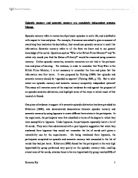Episodic memory and semantic memory are completely independent systems. Discuss.
Episodic memory and semantic memory are completely independent systems. Discuss.
Episodic memory refers to memories of particular episodes in one’s life, and is definable with respect to time and place. For example, if someone was asked to give an account of everything they had eaten the day before, they would use episodic memory to recall this information. Semantic memory refers to all the facts we know and to our general knowledge of the world. Questions such as “Who is the British Prime Minister?” and “In which city would you find the Statue of Liberty?” would be answered using semantic memory. Unlike episodic memories, semantic memories are not tied to the particular time and place of learning. For instance, in order to remember that Tony Blair is the British Prime Minister, it is not necessary to remember the time and place that this information was first learnt. It was proposed by Tulving (1980) that episodic and semantic memory should be ‘regarded as separate’ (Tulving 1980, p. 32). But to what extent are episodic memory and semantic memory completely independent systems? This essay will examine some of the empirical evidence for and against the proposal of an episodic-semantic distinction, and highlight some of the ways in which much of this research is flawed.
One piece of evidence in support of a semantic-episodic distinction has been provided by Kihlstrom (1980), who demonstrated dissociations between episodic memory and semantic memory by using hypnosis to create different brain states in his participants. In the experiment, the participants were first classified in terms of the degree to which they were susceptible to hypnosis. Under hypnosis, the participants repeatedly learnt a list of 16 words. They were then administered with a post hypnotic suggestion that when they awakened from hypnosis they would not remember the list of words until given a reversibility cue by the experimenter. On being awakened from hypnosis, the participants completed an episodic and semantic memory task connected to the list of words they had just learnt. Kihlstrom (1980) found that the participants in the very high hypnotisability group performed very poorly on the episodic memory task, recalling almost none of the words, whereas those in the low hypnotisability group recalled 86% of them. However, all the participants performed equally well on the semantic memory task. It was also found that the episodic memories blocked by the post hypnotic suggestion became accessible once the participants had been given the reversibility cue. The fact that episodic memories were blocked through the use of hypnosis, but semantic memories were unaffected would therefore appear to suggest that episodic and semantic memory are independent systems. However, there have also been other studies which have demonstrated that hypnosis has no significant affect on episodic memory performance. For instance, Graham and Patton (1968) carried out a study in which the participants were asked to learn two list of adjectives, with some of them learning the second list whilst under hypnosis. It was found that the participants in the hypnosis condition showed a similar level of retroactive inhibition from the second list of adjectives to those in the control condition. Therefore, there appears to be an inconsistency between the findings of studies using hypnosis to demonstrate that episodic memory and semantic memory are independent systems.







